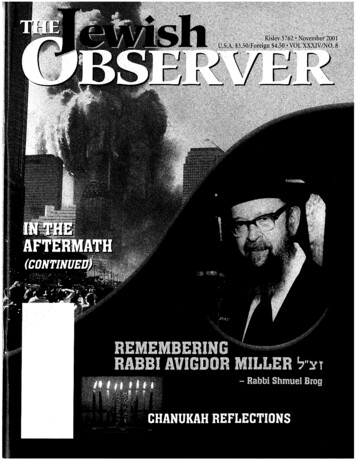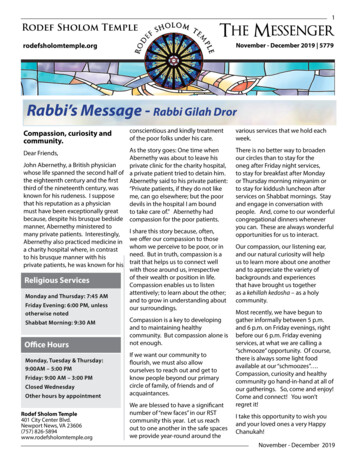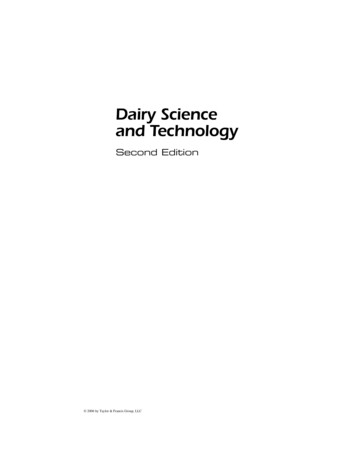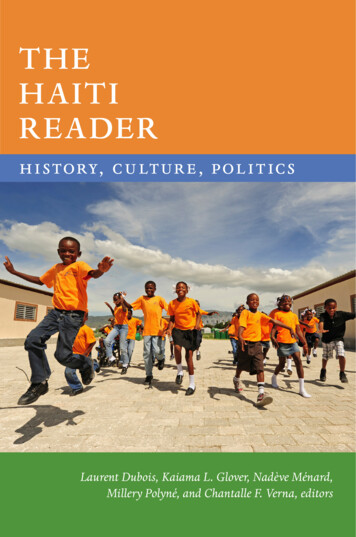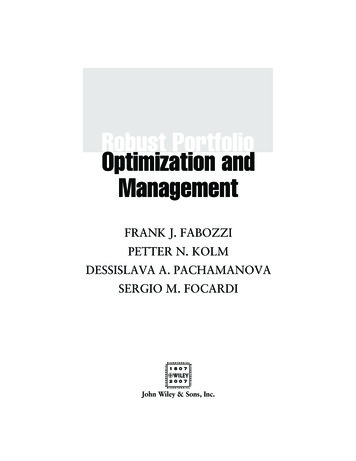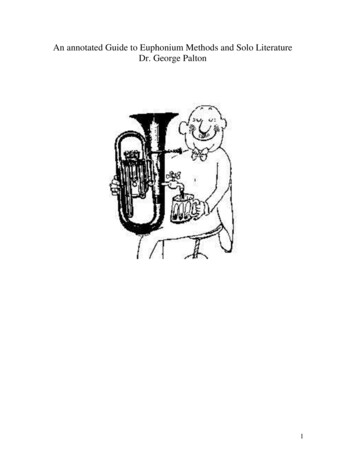
Transcription
Edited by Rabbi Tuly Weisz
The Israel Bible: GenesisFirst Edition, 2018Menorah BooksAn imprint of Koren Publishers Jerusalem Ltd.POB 8531, New Milford, CT 06776-8531, USA& POB 4044, Jerusalem 9104001, Israelwww.menorahbooks.comThe Israel Bible was produced by Israel365 in cooperation withTeach for Israel and is used with permission fromTeach for Israel. All rights reserved.The English translation was adapted by Israel365 from the JPS Tanakh.Copyright 1985 by the Jewish Publication Society. All rights reserved.Cover image: Seth Aronstam - https://www.setharonstam.com/All rights reserved. No part of this publication may be reproduced,stored in a retrieval system or transmitted in any form or byany means, electronic, mechanical, photocopying, or otherwise,without the prior permission of the publisher, except in the caseof brief quotations embedded in critical articles or reviews.The Israel Bible is a holy book that contains thename of God and should be treated with respect.
Table of onxvForewardxviii21iiiAleph Bet ChartBlessing Before and After Reading the TorahThe Book of Genesis153Biographies of The Israel Bible Scholars155Bibliography166List of Transliterated Words in The Israel Bible181Photo Credits182Chart of the Hebrew Months and their Holidays185Map of Modern-Day Israel and its Neighbors186List of Prime Ministers of the State of Israel187Prayer for the State of Israel190Prayer for the Welfare of Israel’s Soldiers192Hatikvah
CreditsCommentary and introductions for The Israel Bible were written by thefollowing scholars:Bereishit (Genesis):Shemot (Exodus):Vayikra (Leviticus):Bamidbar (Numbers):Devarim (Deuteronomy):Yehoshua ( Joshua):Shoftim ( Judges):Shmuel (Samuel):Melachim (Kings):Yeshayahu (Isaiah):Yirmiyahu ( Jeremiah):Yechezkel (Ezekiel):Trei Asar (The Twelve Prophets)Tehillim (Psalms):Mishlei (Proverbs):Iyov ( Job):Shir Hashirim (Song of Songs):Rut (Ruth):Eicha (Lamentations):Kohelet (Ecclesiastes):Esther (Esther):Daniel (Daniel):Ezra v’Nechemya (Ezra and Nehemiah):Divrei Hayamim (Chronicles):Rabbi Tuly WeiszRabbi Tuly WeiszShira SchechterShira SchechterShira SchechterRabbi Shmuel JablonRabbi Shmuel JablonRabbi Shmuel JablonRabbi Shmuel JablonRabbi Yaakov BeasleyRabbi Yaakov BeasleyRabbi Yaakov BeasleyRabbi Yaakov BeasleyRabbi Avi BaumolAhuva BalofskyAlexander Jacob TsykinBatya MarkowitzRabbi Tuly WeiszRabbi Noam ShapiroBatya MarkowitzBatya MarkowitzBatya MarkowitzJosh Even-ChenAlexander Jacob TsykinMaps Editor:Associate Editor:Editor:Lorien BalofskyShira SchechterRabbi Tuly WeiszProduction Management:Commentary Editor:Copy Editing:Typesetting:Cover Design:Icon Design:Avishai MagenceRabbi Alan HaberEfrat GrossEstie DishonTani BayerEliyahu Misgaviv
AcknowledgementsProducing a Tanakh is a massive undertaking that requires a tremendousteam of “wise students,” as the Hebrew expression goes. The Israel Bible wouldnever have seen the light of day without the herculean efforts of numerouscontributors.First and foremost, SHIRA SCHECHTER dedicated several yearsas associate editor of The Israel Bible and saw the project through frombeginning till end. With a perfect balance of meticulousness and fear ofHeaven, she carefully supervised all aspects of research, development, editingand production. Shira’s innate appreciation for Hebrew grammar along withher sharp eye and love for the subject matter, can be felt on every page.Thank you to the esteemed scholars who contributed their immenseTanakh knowledge to this groundbreaking initiative: RABBIS AVIBAUMOL, YAAKOV BEASLEY, SHMUEL JABLON AND ALEXANDERJACOB TSYKIN, AHUVA BALOFSKY, JOSH EVEN-CHEN, and BATYAMARKOWITZ. The breadth of your Torah scholarship, along with your lovefor Israel, served as a constant inspiration.I would like to thank the devoted staff of Israel365 for their vast andvaried contributions to The Israel Bible in the five years since we naively askedeach other, “How hard could it be to create a brand new Tanakh?”First, to LORIEN BALOFSKY who was there in the beginning anddesigned the first versions of The Israel Bible along with many features ofthis volume, including the maps. And to all the other creative geniuses:MAAYAN HOFFMAN, TSIVYA FOX, ORLY GIBSON and SHLOMOVILE. To the brilliant strategic team SHIFRA GOLDMEIER, AYALKELLMAN, STEVEN GOLDSTEIN, SIMONE SOMERS, GILAHALPERN, MAZZ WHITE and CLARINDA YUVIENCO. To the truthseeking reporters and editors of Breaking Israel News, ABRA FORMAN,ELIYAHU ADAM BERKOWITZ, JONATHAN BENEDEK, RIVKAHLAMBERT ADLER and ELIANA RUDEE. And a special yasher koach toSHLOMO SCHREIBMAN whose acumen enabled this important effortto continue.v
I would also like to acknowledge our “alumni” whose skills and personalities shaped The Israel Bible over the years: JILLIAN EZEKIEL, RACHAELPLATT and ALIZA ABRAHAMOVITZ.A major debt of gratitude is owed to my trusted friends and advisorsROBERT FROHLINGER, RAFI COHEN and ARIEL GOLDBERG, whosewise counsel continues to guide Israel365.Thank you to the faculty of the Yeshiva for the Nations RABBISSHIMON APISDORF, ELAN ADLER, YISHAI FLEISHER and MOSHELICHTMAN who taught me a deep appreciation for Eretz Yisrael when I washis student, and SHARON NIV.Teach for Israel made possible the research and writing of The Israel Bibleand I would like to thank the board of directors for their years of friendshipand encouragement: NOAM LIPSHITZ, SCOTT OSBORNE, MARCSINGER and DAVID SWAGGERTY.I am indebted to the spiritual mentorship of RABBI SHLOMORISKIN and DAVID NEKRUTMAN of the Center for Jewish ChristianUnderstanding and Cooperation for their pioneering work and forcontributing the foreward to The Israel Bible.Every page of this volume testifies to the impressive skill of the professionals at Koren Publishers Jerusalem including MATTHEW MILLER,YEHOSHUA MILLER, RABBI AVISHAI MAGENCE, RABBI ALANHABER, YEHUDIT SINGER, ESTIE DISHON, TANI BAYER andASHIRAH YOSEFAH of their Menorah imprint. As Israel’s foremost Biblepublishers, Koren represents a heritage of excellence and it was an honor tocollaborate on this important undertaking with their prodigious staff.Thanks to RABBI BARRY SCHWARTZ and LEIF MILLIKEN for theirassistance in providing the well respected New Jewish Publication SocietyEnglish translation for inclusion in this volume.In addition to its many unique features, The Israel Bible is the first Tanakhto be financed through crowdfunding. I can’t thank enough the close to 1,000contributors of our online campaign who enthusiastically supported our ideaand waited patiently for its publication. While many Jews and non-Jews fromall over the world eagerly participated with great generosity, a sincere thankyou is to a special and humble friend of Israel from Nigeria. I am greatlyappreciative of the gift in honor of EKPE NDIYO EKPE by his loving son.Over the years, I have had many mentors, teachers and rabbis who deeplyimpacted me and taught me a love for Torah. I have been fortunate to benefitfrom many, yet would like to thank RABBI ZEVULUN CHARLOP, dean ofvi
the Rabbi Isaac Elchanan Theological Seminary for our private study sessionsand his enthusiasm for my work in general and this initiative in particular.I would like to acknowledge the influence of my two grandfathers, RABBIDAVID STAVSKY AND GEORGE WEISZ, both of blessed memory. In verydifferent ways, my grandfathers equally taught invaluable lessons of hardwork and self-sacrifice on behalf of Torah. My grandmothers, PEPPI WEISZand RUTH STAVSKY and ROSALIND DOMBROFF have assumed the roleof beloved matriarchs to our family, and should be blessed with longevity.My in-laws, RHONDA and DR. TOM WEISS, are like parents to me andhave provided loving encouragement and much appreciated support. Theyshould see much “nachas” from all their children and grandchildren.I would like to thank my own precious children who were my realinspiration for The Israel Bible. Feeding off their wide-eyed enthusiasmin learning the holy words of the Torah in school — and in Hebrew noless — I felt invigorated to immerse myself in our ancient heritage. Witheternal gratitude to Hashem, I am fortunate for the opportunity each day “toteach these words to my children,” SHAINDEE, BELLA, DOVID, TZOFIAand AMITAI.My ultimate thanks are reserved for my beloved wife, ABBY, for hersteadfast support. Anything I have achieved is to her credit. Certainly, thatis true for The Israel Bible, which only came about through her guiding ourfamily to fulfilling our dream of making Aliyah. May all the blessings thatemerge from the study of The Israel Bible reward her with her innermostprayer: that our children always embrace the eternal values of the Torah ofIsrael.Finally, all my colleagues in producing this volume join me in offeringour profound thanksgiving to the Almighty for permitting us to help spreadlove for the Land and the People of Israel. May the God of Israel continueHis blessings so that The Israel Bible shapes the minds and hearts of all Hischildren for generations to come.Naphtali “Tuly” WeiszRamat Beit Shemesh, IsraelShevat 5778 / February 2018vii
Aleph Bet Chartviii
IntroductionThe Hebrew Bible is commonly known as the Tanakh which stands forTorah (the Five Books of Moses), Neviim (the Prophets) and Ketuvim (theWritings). The Tanakh consists of 24 books that are considered by Jews tobe the word of God. While these books have been referred to as the “OldTestament,” many Jews reject this label since it implies the replacement of theHebrew Bible with something newer and prefer the more authentic Jewishname.The Tanakh is not only the most important book known to man, it isGod’s word that is perfect and absolute. It is therefore a daunting undertakingto publish an edition of the Tanakh, and the responsibilities are awesome.There is no room for error or carelessness in dealing with the eternal word ofGod. Further, upon embarking on such a serious initiative, we ask ourselves ifour efforts are gratuitous. Considering the many editions of the Bible in print,is there truly a need for yet another one?While there are numerous Bibles in circulation today, its most centralaspect — the Land of Israel – has often been overlooked. References to Israelappear on nearly every page, and the city of Jerusalem is specifically referredto hundreds of times throughout the Bible. The essential link between Israeland Torah is emphasized repeatedly in verses such as, “For instruction(Torah) shall come forth from Tzion, the word of Hashem from Yerushalayim”(Micah 4:2).The miraculous return of the People of Israel to the Land of Israel in ourown generation, and the celebration of the State of Israel’s 70th anniversarythis year provides the perfect moment for a new volume to fill this void inbiblical literature. The Israel Bible includes many special features elucidatingGod’s focus on Israel throughout Tanakh and there are many additional,multimedia features available on our website WWW.THEISRAELBIBLE.COM.ix
Ordering and Presentation — In presenting The Israel Bible, our goal is tospread awareness of the biblical significance of the Land of Israel as well asthe Jewish people’s eternal connection to the land, based on the text of theTanakh, the Hebrew Bible. We aim to honor “the God, the People and theLand of Israel” from an Orthodox Jewish perspective. To that end, The IsraelBible follows the traditional Jewish ordering of the books and the customaryHebrew division of chapters. Therefore, for example, we count 24 books ofTanakh with Sefer Divrei Hayamim (Chronicles) appearing last. It is our hopethat our rich content will speak to all Jews and non-Jews who appreciate Israelas the God given land of the Jewish people.English Translation — Throughout history, Jews have studied the Bible inHebrew, as any form of translation would miss much of the nuance of theoriginal holy tongue in which Torah has been transmitted since the days ofMoses. However, as many Jews settled in America in the 19th Century, theneed for an English translation became necessary. To be sure, there werealready English translations prepared over the centuries by Christians, butin the words of the original editors of the Jewish Publication Society ( JPS),“The Jew cannot afford to have his Bible translation prepared for him byothers. He cannot have it as a gift, even as he cannot borrow his soul fromothers.”JPS set out in the late 1800’s to publish an authoritative English translation “in the spirit of Jewish tradition.” It was compiled over decades by someof the leading Jewish scholars of the time. They formed committees and subcommittees to compare existing English versions, considering medieval andmodern Jewish commentators. The monumental JPS translation, originallypublished in 1917, has been updated in recent years and The Israel Bible isproud to utilize the 1984 New Jewish Publication Society (NJPS) versionwith its modern, clear language, as well as its wide-ranging acceptance as anaccurate and high-quality translation. We applied the NJPS translation verbatim, except for a select list of nouns, which we replaced with their traditionalHebrew names. This is true even when we found the NJPS translation to bedifferent than the popular translation of a word or phrase and when the NJPSswitched the order of the text for the sake of clarity (see, for example, Ezekiel24:22-24).Hebrew Transliteration — To give our readers an authentic Tanakh experience, every verse that has commentary is transliterated from Hebrew intoEnglish. The Hebrew alphabet chart includes our standards for transliterationx
and pronunciation of Hebrew verses, enabling readers of The Israel Bible todecipher key biblical passages in the holy language. Readers can hear the entire Bible read in Hebrew on our website WWW.THEISRAELBIBLE.COM.There are various standards when it comes to transliterating Hebrewwords into English letters. While we have relied primarily on the classicalHebrew transliteration, we have occasionally deviated for the sake ofsimplicity, clarity and to reflect common usage.In addition to whole verses, we have also transliterated many propernouns in the English translation so that our readers can learn the names ofkey biblical figures and locations in their Hebrew form. As a rule, we choseto transliterate names of people that were central in the establishment andfunctioning of the nation of Israel, as well as significant places in the HolyLand. Therefore, regarding Adam’s sons, for example, only Shet (Seth)is transliterated since it was from him that Noach (Noah) and ultimatelyAvraham (Abraham) descended. For this reason, there might be verses orsections of The Israel Bible that contains multiple names and only some ofthem are transliterated.For the same reason, we have transliterated the names of the books ofTanakh when referring to them in our introductions and commentary.When referencing a specific chapter or verse, however, we use the Englishnames of the books in our citations for clarity. We also transliterated ideasand concepts that are central to Judaism such as Shabbat (Sabbath), thenames of the Jewish holidays and the Beit Hamikdash (Temple), as well asbiblical measurements. Finally, the name of God is transliterated. Out ofrespect, Orthodox Jews generally refer to the Lord as Hashem, which literallymeans ‘the Name.’ Referring to God as Hashem reminds us that we feelclose to Him but also recognize our distance at the same time. To stressthis moniker, we transliterated both the Tetragrammaton as well as the nameElohim as Hashem.Study Notes — Our unique commentary was compiled by OrthodoxJewish scholars who live in Israel. It is an anthology in the sense that mostof the commentary is not original, but draws from traditional teachings ofearly Jewish Sages and modern rabbinic commentators. We also includequotations from individuals who have played a significant part in the pastcentury of modern Israeli history including Israeli prime ministers, poets andmilitary leaders.xi
Our commentary can be broken into four categories, three of which areidentified by an icon at the beginning of the study note: Israel lessons are indicated with an icon bearing the map of Israeland focus on the Land of Israel and the modern State of Israel.J ewish lessons are indicated with a Torah scroll and teach aconcept in Judaism or a classic idea from rabbinic thought. ebrew lessons are represented by an icon bearing the letter alephHand focus on the meaning of a Hebrew word or phrase.All other comments are considered general comments and are notassigned an icon.Supplemental Material — In addition to our unique translation and originalcommentary, The Israel Bible offers supplementary material to enrich thelearning experience of our readers. Before every book of Tanakh, we providean introduction, as well as information, generally in the form of a map, a chartor a list, which is central to the specific book.Maps — As the purpose of The Israel Bible is to highlight the biblicalsignificance of the Land of Israel, significant time was spent researching andpreparing maps to bring the physical contours of the holy land to life withgreat accuracy. However, since there is a lack of information regarding theprecise locations of certain ancient cities, some of the places on our maps areapproximate or subject to debate. In these cases, we followed the opinionthat we are most comfortable with, but acknowledge that there is room fordisagreement. We continue to produce new maps, which are available on ourwebsite WWW.THEISRAELBIBLE.COM/MAPS.Torah Readings — The Torah is not just a work that is studied privately, it isalso read out loud in synagogue. Every Shabbat and holiday a portion of theTorah is read, as well as a related section from Neviim, the prophets, called thehaftarah. For this reason, we included the blessings recited before and afterthe reading of the Torah. Readers can always find the current week’s Torahportion by visiting WWW.THEISRAELBIBLE.COM/WEEKLY-TORAHPORTION. In this volume, we indicate where a new Torah portion begins byhighlighting the Hebrew verse number with a gray box so readers can followalong with the communal Torah readings. Furthermore, we have includedprayers for the State of Israel and the soldiers of the Israel Defense Forcesxii
(IDF) that are generally recited following the Torah reading in synagogue. Itis our constant prayer that God watch over the State of Israel and themembers of the IDF, who defend Israel every hour of every day.In 1948, the State of Israel was created providing a modern answer to Isaiah’sancient question, “Is a nation born all at once?” (Isaiah 66:8). We are now inthe 70th year of God’s miraculous restoration of the People of Israel to theLand of Israel. Jewish wisdom teaches that 70 is a significant number: Moshe(Moses) translated the Torah into 70 languages for all 70 nations of the world.From our very origins, the Jewish people were meant to be a light unto the 70nations, spreading God’s truth to the masses.In the seven decades since the modern rebirth of the the State of Israel,God’s plan has been unfolding with unprecedented speed, dramatic highsand heart-breaking lows. Never has Israel been at the forefront of the world’sattention as it is in our generation. Efforts to vilify the Jewish State seem tospread every day across the globe. At the same time, so does the growingmovement of millions of non-Jewish biblical Zionists who stand with thenation of Israel as an expression of their commitment to God’s word. As weseek to understand the clash of these two conflicting worldviews, the needfor The Israel Bible has never been so important.Standing on the great shoulders of those who came before us andemanating from the land that has always served as the birthplace for the Bible,we conclude with a heartfelt prayer: May the Almighty bless our efforts inoffering this Tanakh to influence the hearts, minds and actions of its readers.In this way, it is our hope to spread God’s name so that the publication of TheIsrael Bible brings us one step closer to the final redemption of Israel and theentire world.Rabbi Tuly WeiszEditor, The Israel Biblexiii
ForewardThe mandate to study God’s word daily is interestingly not found in the FiveBooks of Moses (Pentateuch), but rather in the first book of our propheticwritings: “Let not this Book of the Teaching cease from your lips, but reciteit day and night, so that you may observe faithfully all that is written in it.Only then will you prosper in your undertakings and only then will you besuccessful” ( Joshua 1:8). Charged with bringing the Israelites into the landcovenantally promised to Abraham, Isaac and Jacob, God ensures Joshuaof His protection if the nation observes His ways as dictated in the Divineconstitution known as the Torah.In Jewish tradition, Joshua (1:8) is directly linked with Deuteronomy(11:14), “You shall gather in your new grain and wine, and oil.”1 Our Sagesdeduced from this scriptural combination the importance of merging Torahstudy with a profession. Completely dedicating oneself to the study of Torahwithout having the financial means to sustain this lifestyle can lead one toeventually straying from observance of God’s will. Poverty and crime canhave an intimate relationship.We must also be careful that our work does not affect our daily study ofScripture. The addiction of becoming a workaholic and not making Torahstudy a priority can also lead one into temptations that can violate ourpersonal relationship with Him as well as our fellow human beings. The goalis to achieve a healthy balance between our study of God’s word and our dailywork.The Deuteronomic verse quoted above is part of the second section ofthe Shema2 that discusses the concept of reward and punishment. SanctifyingGod by fulfilling His commandments results in the Land of Israel practicallybenefitting from rains that occur in the right season and reaping theabundance from the fields. However, if the nation follows pagan gods andpractices, the consequences are devastating – famine and death. The Landof Israel is intrinsically linked with the keeping of the Torah. Covenant Landcomes with covenant responsibility.xv
Born into slavery, Joshua is now leading His people into the PromisedLand. More than 500 years separates him from his ancestral forefatherAbraham. The historical narratives that took place between Abraham leavingeverything behind to follow God in Genesis 12 and the death of Moses in thelast chapter of Deuteronomy are filled with intrigue, suspense, joy, sorrowand hope. What began as a family is now a nation actualizing its mission tobe a kingdom of priests to the world. However, for the Israelites to succeedin the Land of Israel, they must see the Torah as the only compass to directtheir lives.The biblical episodes after our first entry into the land are well known.Our ancestors’ triumphs and sins are all on public record. We learned theharsh reality of Leviticus (18:28) “So let not the land spew you out fordefiling it as it spewed out the nation that came before you.” Twice, we lostthe privilege to be stewards of the Land of Israel and to fulfill our nationstate mandate to be a light to the world. However, when the annals of historywere ready to archive the Jewish people after the Holocaust, God kept Hiscovenantal promise and gathered us from the four corners of the globe tocome home. The year 1948 was a game changer. Biblical prophecies were andare being realized. We are now living in the birth pangs of the messianic era.In our morning prayers, we recite a series of blessings over the Torahthat include petitioning God to have a sweet tooth for His word, to study itwithout any ulterior motive and to have Him to teach it to us. They are somecongregations that invoke the following liturgical prayer after the completionof these blessings: May the Torah be my faith and El Shaddai my help. Blessedbe the name of His glorious kingdom forever and all time.According to Jewish tradition, the neglect of not blessing the Torahbefore engaging in its study was one of the reasons for the destruction ofthe Temple.3 This is deduced from the redundancy of words in Jeremiah(9:12) that talks about Israel not following God: “ Because they forsook theteaching I had set before them. They did not obey Me and they did not followit [did not make a blessing before studying it].” Our inability to properlycherish God’s greatest gift to the world, the Torah, led to our eventual exilefrom our land.The State of Israel will celebrate its 70th birthday this year. On Israel’sIndependence Day, Jews around the world recite Psalms 113-118 to expressour gratitude to God for His Divine hand in helping establish the State of3. Babylonian Talmud Nedarim 81axvi
Israel. We have learned from our past and realize the privilege to see firsthandthe land, people and Torah operating all together in our generation.When Rabbi Tuly Weisz approached me about his intent to publish TheIsrael Bible that would highlight commentary about the special relationshipbetween the land and people, I saw this project as another way to publiclydemonstrate our appreciation to God for having the State of Israel. Inaddition, it is another educational tool to ensure biblical literacy. If we are totruly enjoy the Land of Israel, it is incumbent upon us to continually studythe Torah. Isaiah once prophesied that the Jewish people would return toZion with songs, “crowned with everlasting joy” (35:10). The Israel Bibleprovides us the lyrical content to express our joy in living in the land thatGod calls holy.Rabbi Shlomo RiskinChief Rabbi of EfratFounder of the Center for Jewish-ChristianUnderstanding & Cooperation (CJCUC)xvii
Blessing Before Reading the Torah:The one who has been called up to the Torah says:Bless Hashem, the one who is ba-r’-KHU et a-do-NAI hamblessedvo-RAKH ָ ּב ְרכ ּו ֶאת יְ יָ ַה ְמב ָֹר ְך The Congregation responds:Blessed is Hashem, the oneba-RUKH a-do-NAI ham-vowho is blessed, for all eternity RAKH l’-o-LAM va-ED ָ ּברו ְּך יְ יָ ַה ְמב ָֹר ְך לְ עולָ ם וָ ֶעד The one who has been called up to the Torah continues:Blessed is Hashem, the oneba-RUKH a-do-NAI ham-vowho is blessed, for all eternity RAKH l’-o-LAM va-EDBlessed are you, Hashemba-RUKH a-TAH a-do-NAIOur God, King of theuniverseWho has chosen use-lo-HAY-nu ME-lekh ha-oLAMa-SHER BA-khar BA-nuFrom among all the nationsmi-KOL ha-a-MEEMAnd has given usv’-NA-tan LA-nuHis Torahet to-ra-TOBlessed are you, Hashemba-RUKH a-TAH a-do-NAIGiver of the Torahno-TAYN ha-to-RAH ָ ּברו ְּך יְ יָ ַה ְמב ָֹר ְך לְ עוֹ לָ ם וָ ֶעד ָ ָ ּברו ְּך ַא ָּתה יְ י ֱאל ֵֹהינ ּו ֶמלֶ ְך ָהעוֹ לָ ם ֲא ׁ ֶשר ָ ּב ַחר ָ ּבנ ּו ִמ ָּכל ָה ַע ִּמים וְ נָ ַתן לָ נ ּו ֹ ֶאת ּתוֹ ָרתו ָ ָ ּברו ְּך ַא ָּתה יְ י נוֹ ֵתן ַה ּתוֹ ָרה Blessing After Reading the Torah:Blessed are you, Hashemba-RUKH a-TAH a-do-NAIOur God, King of theuniverseWho has given use-lo-HAY-nu ME-lekh ha-oLAMa-SHER NA-tan LA-nuThe Torah of truthto-RAT e-METAnd planted eternal lifewithin usBlessed are you, Hashemv’-kha-YAY o-LAM na-TA b’to-KHAY-nuba-RUKH a-TAH a-do-NAIGiver of the Torahno-TAYN ha-to-RAHָ ָ ּברו ְּך ַא ָּתה יְ י ֱאל ֵֹהינ ּו ֶמלֶ ְך ָהעוֹ לָ ם ֲא ׁ ֶשר נָ ַתן לָ נ ּו ּתוֹ ַרת ֱא ֶמת וְ ַח ֵ ּיי עוֹ לָ ם נָ ַטע ְ ּבתוֹ כֵ נ ּו ָ ָ ּברו ְּך ַא ָּתה יְ י נוֹ ֵתן ַה ּתוֹ ָרה xviii
Sefer BereishitThe Book of GenesisIntroduction and commentary by Rabbi Tuly WeiszSefer Bereishit (Genesis) is the first of the Five Books of Moshe. SeferBereishit begins with a detailed description of the creation of the world,and continues with a brief account of the generations from Adam throughAvraham. The remainder of the book focuses on the lives of the matriarchsand patriarchs, culminating with the story of the departure of the family ofYaakov from the land of Israel and their descent to Egypt.Rabbi Shlomo Yitzchaki, the famed medieval commentator known byhis acronym Rashi, asks a compelling question. If the Torah is essentiallya book of law, why did God choose to start it with the stories of creation?Would it not have made more sense to begin with the first commandmentgiven to the Jewish people? Quoting the verse from Sefer Tehillim (Psalms111:6), “He revealed to His people His powerful works, in giving them theheritage of nations,.” Rashi explains that the Lord began His Torah with theaccount of the creation of the world in order to give the People of Israel aresponse to anyone who would accuse them of stealing the Land of Israel:Since Hashem is the Creator of the world, it is His prerogative to give it towhomever He chooses. Though He initially gave it to the seven nations ofCanaan, when they were no longer worthy He chose to take it from themand to give it to the Children of Israel.This theme of choice and choosing is present throughout the book. SeferBereishit is known as the book of creation. Most obviously, this refers tothe description of the creation of the world, but beyond that it is about thecreation of a people, the nation chosen by Hashem to be His representativesin the world and to carry out His mission of being a light unto the nations.In every generation described in Sefer Bereishit, there is a person or a groupthat stands out from the rest, and is chosen by God due to their moralityand recognition of God. Once a person is chosen, the continuation of thenarrative focuses on him and his offspring, often emphasizing their positivequalities. Thus, Shet is the chosen son of Adam, Noach is chosen to survive21
his entire generation, and the Bible then focuses on the descendants ofNoach's son Shem. Ultimately, Hashem chooses Avraham, his son Yitzchakand Yitzchak’s son Yaakov. With Yaakov, the process of choosing is completeand a nation is born.As Rashi implies, the Torah is much more than a book of laws; it is thelegacy of the Jewish people. It tells of the creation of a nation, chosen byGod to be His emissaries of kindness, justice, go
Hebrew division of chapters. Therefore, for example, we count 24 books of Tanakh with Sefer Divrei Hayamim (Chronicles) appearing last. It is our hope that our rich content will speak to all Jews and non-Jews who appreciate Israel as the God given land of the Jewish people. English Transl
